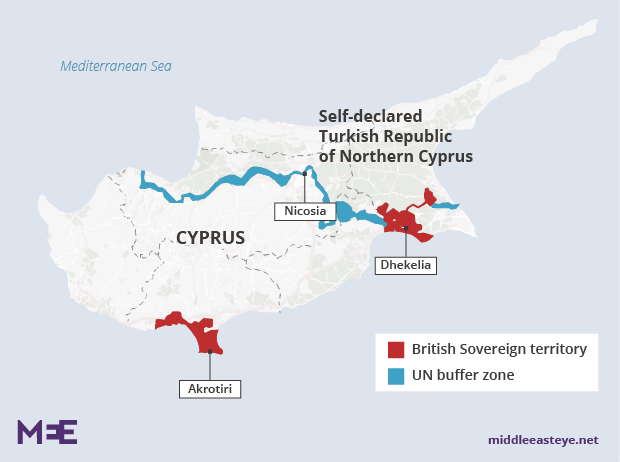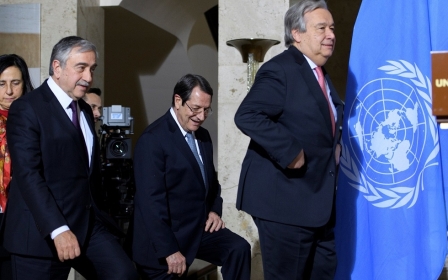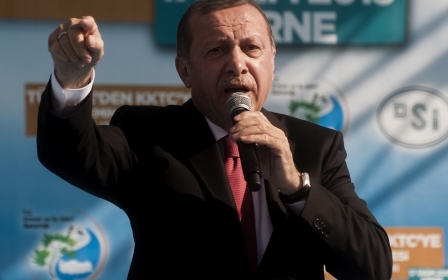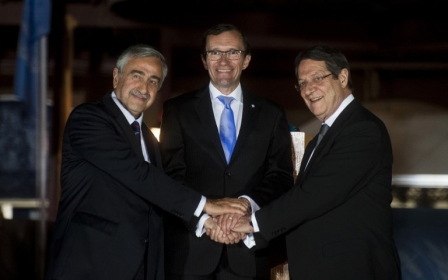ANALYSIS: How Cyprus stalemate serves British interests
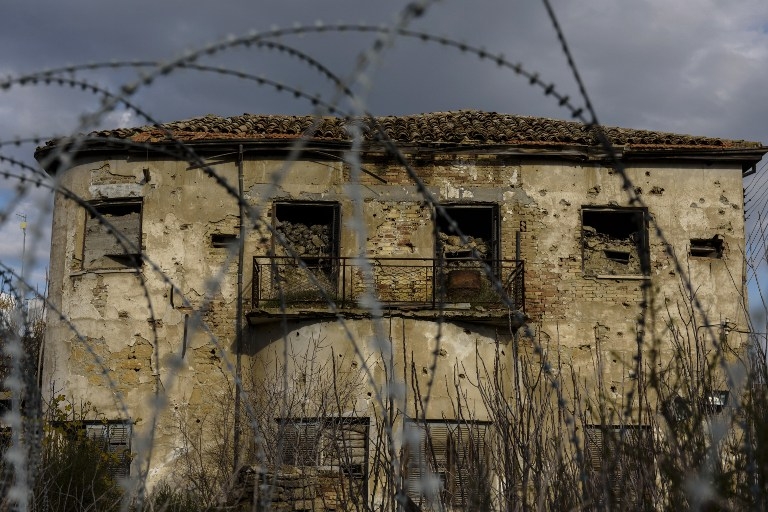
The presence of Boris Johnson at last week’s short-lived Cyprus unification talks in Switzerland owed more to Britain’s strategic interests than its historic obligations to the divided Mediterranean island, according to analysts.
Although the meeting in Geneva between Greek and Turkish Cypriot representatives and officials from Athens and Ankara broke up last Thursday with most observers noting little in the way of progress towards resolving the decades-old issue, the British foreign secretary appeared to take a more positive view of proceedings.
“I welcome the real progress made towards finding a solution to the Cyprus settlement over the last few days, in particular on the future security of a united Cyprus,” he said.
But as Ayla Gurel from the Cyprus branch of the Peace Research Institute Oslo (PRIO) pointed out, as far as British interests were concerned, the discussion of security did not simply concern the future security of the people of Cyprus on either side of the "green line" that separates the self-declared Turkish Republic of Northern Cyprus from the Republic of Cyprus, an EU member state.
“Cyprus is a strategically important country and has British bases on the island,” Gurel told Middle East Eye. “Britain tries to keep a low profile. It has no strong views about what the solution should be as long as nobody touches its bases.”
Retained when Cyprus achieved independence from Britain in 1960, the military bases and installations form part of the Sovereign Base Areas (SBA) – a British Overseas Territory.
Recently, they have been crucial in the international fight against the Islamic State (IS) group in Syria and Iraq, and contribute to ECHELON, a global eavesdropping network led by Britain and the United States that was first publicly disclosed by Edward Snowden, the whistleblower who leaked extensive details of the National Security Agency’s surveillance operations in 2013.
With the same status as Gibraltar or the Falklands Islands, the SBA contains towns and villages which are home to about 10,000 Cypriots, many of whom fled there when Turkey invaded and occupied the island in 1974.The UK government says it is willing to cede almost half of the SBA should the two sides reach a settlement, although the foreign office told MEE that the land giveaway would not affect the military functions of the bases.
“This offer will not prevent military personnel at the bases carrying out their vital work to promote our security and that of the wider region,” a spokesperson said.
“The SBAs conduct a range of priority activities including against Daesh [IS] as well as humanitarian and conflict prevention operations.”
Yet, given their importance, Gurel said there were “grounds to argue that the island's division helps the British bases to remain untouched”.
William Mallinson, a former British diplomat and expert on British-Cypriot relations at the Marconi University in Rome, told MEE that power politics continued to shape the UK’s attitude to an island where it has maintained a military presence since the 1878 settlement that saw the Ottoman Empire cede control to Britain.
Great Game to Cold War
Mallinson said that the UK’s view of Cyprus has evolved over time from a romantic imperial possession alongside India and Egypt to an outright liability before finally becoming a cornerstone of the so-called “special relationship” with the United States.
The UK’s acquisition of Cyprus came amid the “Great Game” played out between Russia and the British Empire across Asia and Middle East. Through two world wars, Cyprus remained crucial to Britain’s projection of global power.
Yet following the Turkish invasion of 1974, a weakened Britain was close to withdrawing, with an internal foreign office memo declaring that the bases had “usually been more of a liability than an asset”.
But Britain’s growing indifference set off alarm bells in Washington where US Secretary of State Henry Kissinger feared Cyprus would fall under Soviet influence, prompting a heated exchange with British foreign secretary James Callaghan.
“We shall not in present circumstances proceed with our preferred policy of withdrawing from the Sovereign Base Areas altogether,” Callaghan subsequently wrote to Kissinger.
By 1980, the SBA were considered “irreplaceable” and an “essential contribution to the Anglo-American relationship”, in the words of a senior foreign official who also warned about the prospect of a quick resolution to the Cypriot political divide: “Our interests are best served by continuing movement towards a solution – without the early prospect of arrival."
Mallinson said that Britain’s continued presence on the island had allowed Washington and London to "keep Cyprus in their NATO ambit", and outside of Russia’s sphere of influence.
According to a treaty Cyprus signed on independence, Greece, Turkey and Britain have the right to “re-establish the state of affairs” should the country come under threat from "enosis" - the longing of some Greek-Cypriots to unite with Greece, and "taksim", the historical objective of some Turkish-Cypriots to partition the island.
Mallinson said that British foreign office correspondence showed that Britain had foreknowledge and gave tacit support to the Turkish invasion of 1974 after a Greek-Cypriot uprising earlier that year threatened to overthrow the government and unify the island with Greece.
According to Mallinson, foreign office officials at the time said there was authorisation for “the Turks to take unilateral action” under the terms of the so-called Treaty of Guarantee, as Britain even contemplated whether to take part in the invasion.
While Turkey’s action was motivated by historic, legal and fraternal links to the former Ottoman possession, the invasion and subsequent division of the island by a fellow NATO member had also served Anglo-American interests in the eastern Mediterranean, Mallinson said.
British bases 'not in question'
Yet others see Britain as playing a more honest role as a guarantor of Cyprus’s independence amid intractable differences between Greece and Turkey.
Harry Tzimitras, the director of PRIO who has held positions at the University of Cambridge and at universities in Turkey, told MEE that Britain was driving the talks forward as “the pen-holder in the United Nations” process in Geneva.
‘Britain is at the forefront of countries that are being helpful in finding a solution to the problem, he added.
Talk of Britain relinquishing its bases, he said, “did not come into question” among the negotiators.
But if the main opposition political party in Cyprus has its way then both British and Turkish forces could soon be on their way home.
The communist Progressive Party of Working People (AKEL) won a 2008 general election on the back of a promise to demilitarise the island.
Elias Demetriou, a party spokesperson, told MEE: “AKEL has always been against the presence of the British bases in Cyprus. In AKEL we have the position that, if and when an agreement is reached for the Cyprus problem, then it will be possible for the issue of the British bases to be taken up by the Cypriot people as a whole. In this way the goal for a demilitarised island can be achieved.”
Gurel, who has worked to raise awareness of political issues on the island, said that while Cypriots’ relationship with the bases is at times “schizophrenic”, the main stumbling block to peace was that Greek-Cypriots had a lot more to lose than their Turkish-Cypriot counterparts.
“They are a recognised state... their red line is that the new state of affairs should be a continuation of the existing Republic of Cyprus,” she said.
But, she added, the recent discovery of hydrocarbon resources in Cyprus’s seas might affect their hesitation.
“There is an understanding within the Greek-Cypriot political leadership that in order to get the optimal benefit both in economic terms from the hydrocarbons in the waters of Cyprus it would be better to solve the conflict. That's a very fundamental thing.”
Mallinson told MEE that Cyprus remained as ensnared in geopolitical realities as it had been during the Great Game of the 19th century or the Cold War of the 20th.
Cyprus would not become a “proper independent country” he predicted, while “this NATO-Russia hysteria continues, before adding: “Only if Trump and Putin agree.”
This article is available in French on Middle East Eye French edition.
Middle East Eye propose une couverture et une analyse indépendantes et incomparables du Moyen-Orient, de l’Afrique du Nord et d’autres régions du monde. Pour en savoir plus sur la reprise de ce contenu et les frais qui s’appliquent, veuillez remplir ce formulaire [en anglais]. Pour en savoir plus sur MEE, cliquez ici [en anglais].


